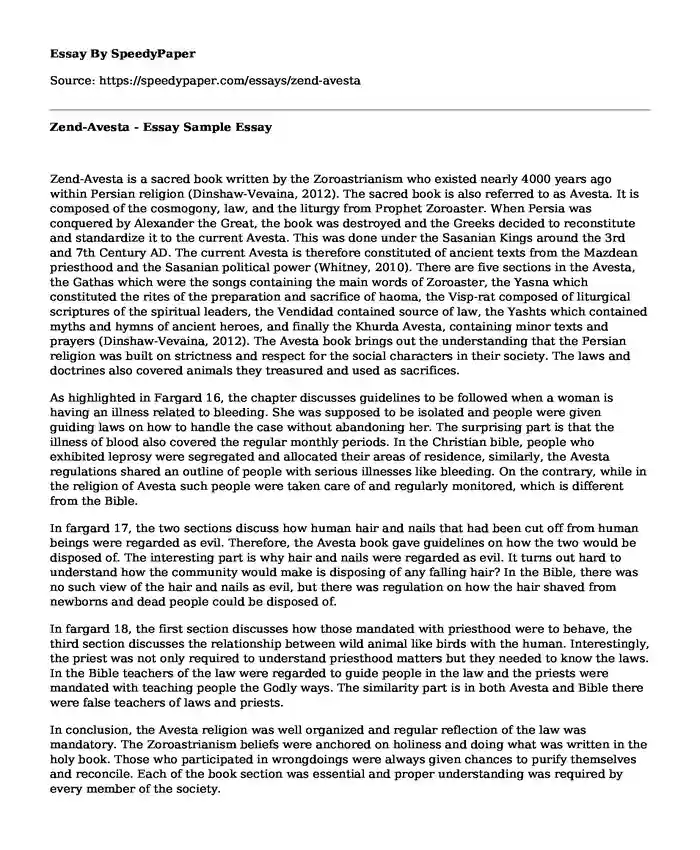
| Type of paper: | Essay |
| Categories: | Religion Ancient history |
| Pages: | 3 |
| Wordcount: | 590 words |
Zend-Avesta is a sacred book written by the Zoroastrianism who existed nearly 4000 years ago within Persian religion (Dinshaw-Vevaina, 2012). The sacred book is also referred to as Avesta. It is composed of the cosmogony, law, and the liturgy from Prophet Zoroaster. When Persia was conquered by Alexander the Great, the book was destroyed and the Greeks decided to reconstitute and standardize it to the current Avesta. This was done under the Sasanian Kings around the 3rd and 7th Century AD. The current Avesta is therefore constituted of ancient texts from the Mazdean priesthood and the Sasanian political power (Whitney, 2010). There are five sections in the Avesta, the Gathas which were the songs containing the main words of Zoroaster, the Yasna which constituted the rites of the preparation and sacrifice of haoma, the Visp-rat composed of liturgical scriptures of the spiritual leaders, the Vendidad contained source of law, the Yashts which contained myths and hymns of ancient heroes, and finally the Khurda Avesta, containing minor texts and prayers (Dinshaw-Vevaina, 2012). The Avesta book brings out the understanding that the Persian religion was built on strictness and respect for the social characters in their society. The laws and doctrines also covered animals they treasured and used as sacrifices.
As highlighted in Fargard 16, the chapter discusses guidelines to be followed when a woman is having an illness related to bleeding. She was supposed to be isolated and people were given guiding laws on how to handle the case without abandoning her. The surprising part is that the illness of blood also covered the regular monthly periods. In the Christian bible, people who exhibited leprosy were segregated and allocated their areas of residence, similarly, the Avesta regulations shared an outline of people with serious illnesses like bleeding. On the contrary, while in the religion of Avesta such people were taken care of and regularly monitored, which is different from the Bible.
In fargard 17, the two sections discuss how human hair and nails that had been cut off from human beings were regarded as evil. Therefore, the Avesta book gave guidelines on how the two would be disposed of. The interesting part is why hair and nails were regarded as evil. It turns out hard to understand how the community would make is disposing of any falling hair? In the Bible, there was no such view of the hair and nails as evil, but there was regulation on how the hair shaved from newborns and dead people could be disposed of.
In fargard 18, the first section discusses how those mandated with priesthood were to behave, the third section discusses the relationship between wild animal like birds with the human. Interestingly, the priest was not only required to understand priesthood matters but they needed to know the laws. In the Bible teachers of the law were regarded to guide people in the law and the priests were mandated with teaching people the Godly ways. The similarity part is in both Avesta and Bible there were false teachers of laws and priests.
In conclusion, the Avesta religion was well organized and regular reflection of the law was mandatory. The Zoroastrianism beliefs were anchored on holiness and doing what was written in the holy book. Those who participated in wrongdoings were always given chances to purify themselves and reconcile. Each of the book section was essential and proper understanding was required by every member of the society.
References
Dinshaw-Vevaina, Y. S. (2012). Avesta. The Encyclopedia of Ancient History. https://doi.org/10.1002/9781444338386.wbeah12023
Whitney, W. D. (2010). On the Avesta. https://doi.org/10.31826/9781463230203
Cite this page
Zend-Avesta - Essay Sample. (2023, Dec 13). Retrieved from https://speedypaper.com/essays/zend-avesta
Request Removal
If you are the original author of this essay and no longer wish to have it published on the SpeedyPaper website, please click below to request its removal:
- Essay Sample on Christianity, Islam and Judaism for Free
- The Glory of God - Free Essay Sample in Religion
- Essay Example Dedicated to Islamophobia in the United States
- Paper Example. Views of Faith and Reason
- Free Essay on Ethical Dilemmas - Christian Worldview/Bible Study
- Discoveries That Rewrote History - Essay Sample
- Book Review Sample for "Teaching the Faith Forming the Faithful: A Biblical Vision for Education in the Church"
Popular categories




